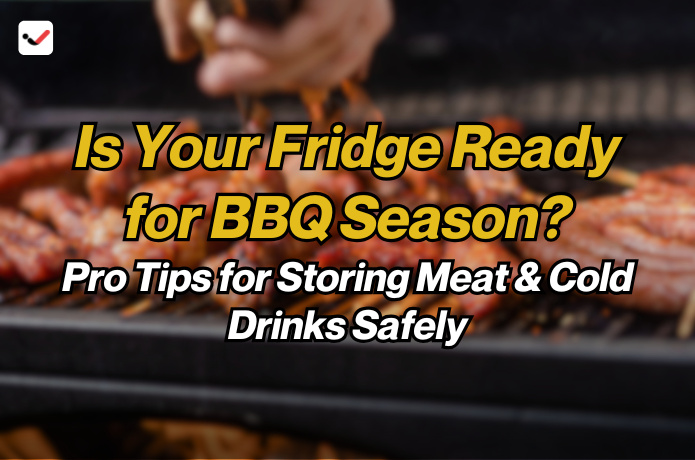Is Your Fridge Ready for BBQ Season? Pro Tips for Storing Meat & Cold Drinks Safely
Is Your Fridge Ready for BBQ Season? Pro Tips for Storing Meat & Cold Drinks Safely

BBQ season is the highlight of summer for many households. Whether you're grilling steaks, burgers, or veggies, the fun starts in the kitchen—and more specifically, in your refrigerator. The way you store your meat and beverages before the cookout can make or break your BBQ. Poor storage can lead to food waste, bad taste, or worse, food poisoning. That’s why it’s critical to prep your fridge before firing up the grill.
With warm weather comes an increased risk of food spoilage. High temperatures and improper storage are a dangerous combo. To keep everyone safe and satisfied, you need to know how to store fresh meat, marinated meat, and cold drinks the right way. Let’s break down the must-know tips to keep your fridge BBQ-ready, avoid waste, and stay food-safe all summer long.
1. Clean Out the Fridge Before BBQ Season Starts
Before you start buying packs of sausages, ribs, and soda, make space. Go through your fridge and throw out expired sauces, old leftovers, and anything with visible mold or spoilage. Wipe down the shelves using warm soapy water or a food-safe cleaner. This removes bacteria that could contaminate new food. A clean fridge isn't just tidy—it’s a safer place to store raw meat and fresh drinks.
Also, check the back of your fridge. Many households forget leftovers hiding behind condiments or boxes. Clearing out the clutter creates room for trays of marinated chicken or stacked soda cans, and helps cold air circulate better.
2. Keep Your Fridge at the Right Temperature
The ideal fridge temperature is below 40°F (4°C). This slows bacterial growth and keeps meat fresh longer. Anything above that, and you risk spoilage. Use a fridge thermometer to double-check if you're unsure. Just because the fridge feels cool doesn’t mean it’s cold enough for safe meat storage.
During BBQ season, your fridge may get opened more often, letting warm air in. Avoid overcrowding, because when items are jam-packed, cold air can't circulate properly. Leave enough space between items so the temperature stays consistent throughout.
3. Store Raw Meat on the Bottom Shelf
Raw meat should always go on the bottom shelf. This keeps juices from dripping onto other foods and spreading bacteria. Use a tray or rimmed plate to catch any leaks. Even if the packaging looks sealed, it’s not worth the risk.
Keep different types of meat separated. Store beef, poultry, and pork in individual containers or bags. Cross-contamination is a major cause of foodborne illness during grilling season. This simple step keeps your meat safe and your guests healthy.
4. Marinate with Safety in Mind
Marinating meat adds flavor, but it needs to be done right. Always marinate in the fridge—not on the counter. Use sealed containers or zip-top bags to keep the marinade in and air out. And never reuse marinade that’s touched raw meat unless you boil it first to kill bacteria.
If you're preparing meat ahead of time, label your containers with the date. Most marinated meats should be used within 24 to 48 hours for both safety and flavor. If you’re not grilling that day, freeze the meat to keep it fresh.
5. Use a Meat Drawer If Your Fridge Has One
Many modern fridges come with a dedicated meat drawer or deli drawer. These areas are colder than other shelves, making them ideal for storing steaks, burgers, and ribs. Use them if available, especially if you're prepping a lot of meat for a weekend BBQ.
If your fridge doesn’t have one, the bottom shelf still works best. Just make sure to monitor the temperature and avoid stacking meat too high.
6. Chill Drinks Without Wasting Space
Cold drinks are essential for any BBQ, but cans and bottles take up a lot of room. Instead of stuffing them into your fridge, consider using a cooler with ice for overflow. For the fridge, stack drinks horizontally to save space and keep them easily accessible.
If you’re serving guests, chill drinks at least 4–6 hours ahead of time. This ensures they're cold when people arrive and reduces fridge door openings during the party, which helps maintain the internal temperature.
7. Don’t Forget Food Safety Timing
Meat and dairy items should never stay out longer than 2 hours—or 1 hour if it's above 90°F outside. Have a system in place to bring items out only when needed. You can also rotate items between a cooler and the fridge to keep them cold.
Once the BBQ is over, refrigerate any leftovers within 2 hours. Use airtight containers to avoid moisture loss and contamination. Label leftovers with the date and aim to eat or freeze them within 3 to 4 days.
8. Keep a BBQ Supply Zone in Your Fridge
To stay organized, create a dedicated section in your fridge for BBQ supplies. Store buns, condiments, pickles, and meat in one area. This helps you grab what you need quickly without rummaging through shelves. Use bins or baskets to keep smaller items like cheese slices, toppings, and sauces together.
A supply zone keeps things moving smoothly on grill day. It also prevents raw meat from mixing with ready-to-eat items, reducing the risk of contamination.
9. Don’t Overload Before a Big BBQ
Planning a big backyard BBQ? Don’t overload your fridge with more than it can handle. It’s tempting to stock up all at once, but too much food will strain the cooling system and cause uneven temperatures. Shop in batches if needed, and prep meat in stages.
If space is tight, consider using a second fridge or a cooler with ice packs. Just make sure everything stays under 40°F. This ensures that your burgers, hot dogs, and chicken wings are safe and tasty when it’s time to grill.
10. Regularly Check Use-By Dates
During BBQ season, it’s easy to forget how long something’s been in the fridge. Make a habit of checking use-by dates regularly. If meat smells sour or has a slimy texture, don’t take chances—throw it out. Better safe than sorry when it comes to food poisoning.
Even drinks can expire. Juices, mixers, and milk-based beverages should be used before their date for best quality. Keeping a mental or written log helps you avoid surprises.
Your fridge is the engine room of BBQ season. If it’s clean, cold, and organized, everything runs smoother. From storing raw meat safely to keeping cold drinks chilled, these tips help you stay prepared and prevent food safety issues. Don’t wait until guests are at the door—get your fridge BBQ-ready now and enjoy a summer of stress-free grilling.

